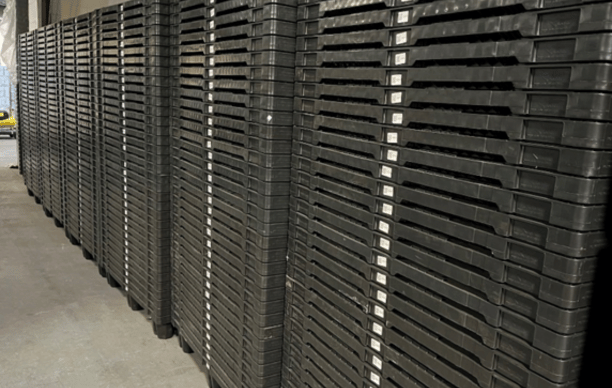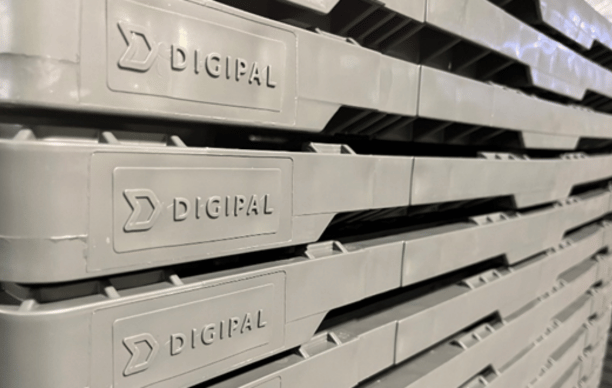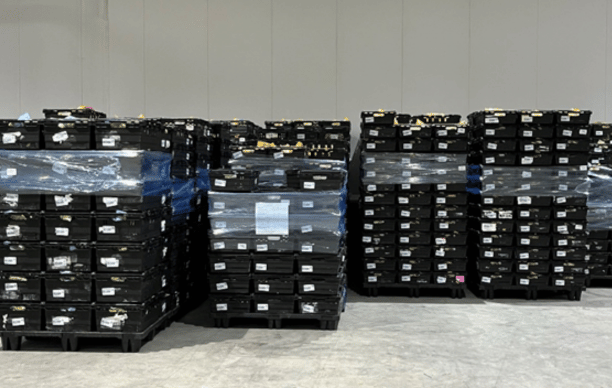In the world of logistics, time is money. The more you can optimise your transportation, storage, and reverse logistics with dedicated solutions the more you can save in your day-to-day operational costs.
One tool that has seen relatively zero innovation in most logistical processes is the ‘pick pallet’. So, what can you do to drive efficiency and improve productivity in your picking supply chain?
Modernise your warehouse operations
A pick pallet typically refers to a wooden pallet or metal roll-cage, commonly used to transport items from storage to the shop floor.
- Wooden pallets: A strong and sturdy solution but with limited life value, high contamination possibilities and hard to manoeuvre when transporting goods from storage to the shop floor
- Metal roll cages: An easy-to-manoeuvre and light solution, making transportation easy but with relatively light loads they can become dangerous and unstable when overloaded
- Sustainable plastic pallets: A lighter and stronger solution with nestable functionality, ergonomic handling, and a breakage rate of just 1-2% for enhanced efficiency across your entire supply chain
As a compelling alternative to traditional pick pallets – plastic solutions allow users to modernise their backend logistic operations.
Plus, you don’t get any of those nasty splinters.
But let’s dig a little deeper…
Save on storage
A common problem with traditional pick pallet solutions is just how much space they take up. Roll cages are big pieces of kit with heights ranging from 150 to 183 cm – this can vastly impact the amount of space you have in your back storage for goods and products, resulting in more regular shipments and increasing your operational costs throughout the year.
Whilst wooden pallets take up less space and can be stacked, you’re limited on the amount you can store depending on the height of each pallet which is around 16cm.

Digipal’s Plastic Pallets offer nestable functionality allowing for space–saving stacking – with the ability to store up to 35 Digipal Plastic Pallets per stack. This enables our users to store 69% more empty pallets in their reverse logistics at 910 per truckload as opposed to 390 per truckload for traditional pallets.
Low damage rates
Although typical pallets seem durable – they are quite easy to damage in day-to-day handling. With their weight, design and being prone to splinter, this can lead to drops, chips, and cracking.
Over time, the structure of wooden pallets can be compromised through weather conditions – damage from the sun and rot setting in from rain can leave your wooden pallets more likely to crumble than support your logistics process.
Broken pallets lead to damaged goods, refunds and complaints being issued.

Plastic pallets are far more durable to general wear and tear with breakage rates between 1-2% making them 25x more durable and 25x more reliable than traditional pick pallet solutions.
Harder, better, faster, stronger
When taking goods from A to B, whether that’s from your back storage to the shop floor or from one warehouse to another, you want an efficient process and as few trips as possible – for your ego’s sake.
Metal roll cages can become unstable and dangerous when carrying heavy loads due to their slimmer and taller designs. This incentivises lighter loads making the implied strength of your roll cages irrelevant due to the inability to maximise the capacity safely.
The issue when determining the strength of wooden pallets varies depending on their level of use. It’s very unlikely when pooling or renting your wooden pallets that you’re going to receive a brand-new unused one and, as mentioned above, day-to-day handling can incur significant damage and negatively impact the integral strength of your pallets.

Plastic pick pallets are 30% lighter than wooden pallets – making your trip from storage to the shop floor easier and more efficient.
Sustainability
With the global push towards Net Zero operations, nearly all retailers have launched sustainability initiatives to cut their own scope 1 emissions and that of their supplier’s scope 3 emissions.
This has caused these initiatives to trickle down to their suppliers including packaging and logistics. With this in mind, boosting sustainable practices through delivery and reverse logistics should be at the top of the priority lists for any retail supporting business.
With our incredibly low damage rate and 100% recyclable materials making the Digipal range truly sustainable – we have helped our clients reduce their carbon footprints by simply changing their picking solution. One of our clients was able to save more than 30,000 trees with us supplying over 200,000 plastic pallets over 5 years.